NTU holds in-person convocation ceremonies for graduates of 'unshakable resolve'
Sign up now: Get tips on how to help your child succeed

Lee Kuan Yew gold medal award recipient Gerald Sim (right) receives his award from President Halimah Yacob, on Sept 17, 2021.
ST PHOTO: NG SOR LUAN
SINGAPORE - A semester into university, Nanyang Technological University (NTU) student Gerald Sim received news that his father had suffered a stroke.
His attention turned from his studies to caring for his father's needs, such as accompanying him to the doctor for regular visits.
Mr Sim said: "No amount of preparation could have prepared me for that. It was hard to handle and there was so much emotional stress."
The computer science student himself has a long-running medical condition that affects his ability to write - a constant reminder that success would not come easy.
After four years of studies, Mr Sim, 26, will receive his degree at this year's NTU Convocation next Monday (Sept 20).
He is one of 9,200 NTU graduates who will emerge from nearly two years of unconventional academic life, into a working world vastly different from when they first entered university.
This is the second in-person convocation ceremony held by NTU amid the Covid-19 pandemic, after a delayed event was conducted for the Class of 2020 in March.
Originally scheduled for July, plans for this ceremony were thrown into limbo when the number of Covid-19 cases rose.
The ceremonies are now going ahead, with the first held on Friday attended by President Halimah Yacob, as Chancellor of NTU.
Mr Sim was one of 36 graduates who received the Lee Kuan Yew Gold Medal on Friday at the ceremony, with his parents in attendance.
This is awarded to students with general proficiency in their programme and Honours (Highest Distinction).
"I learnt that life was not in my control and to work around these tough circumstances and go with it," Mr Sim said. "I think it means a lot to my parents and I to be here together."
This year's convocation ceremonies will be spread over 44 sessions from Friday to Oct 2 - held in-person and streamed online from the Nanyang Auditorium.
This is roughly twice the usual number of ceremonies, to reduce group sizes and lessen the risk of Covid-19 transmission.
Up to 500 attendees can be present at a time, and they have to provide proof of vaccination or a negative swab test result in the past day.
In the hall, they are spaced two seats apart and divided into 10 zones to prevent intermingling.
Friday's event also marked the start of celebrations for the university's 30th anniversary. It was commemorated with the launch of a digital time capsule that will be reopened in 2041, when NTU turns 50.
Minister for Education Chan Chun Sing provided its first artefact, a video letter addressed to students who will witness its reopening in 20 years.
NTU president Subra Suresh told graduates at the ceremony: "The Class of 2041 may marvel at how we thrived at a time when we were most tested in our history."
He cited examples of students supporting peers in quarantine and pulling through the disruptions caused by the virus.
"Your unshakeable resolve and concern for one another during the Covid-19 pandemic have been remarkable to watch," he said.
Electrical and electronic engineering graduate Duan Jia Fei, 26, one of 17 graduates who received the Koh Boon Hwee Scholars Award on Friday, said his cohort had to learn to be adaptive to dynamic changes.

As many classes were brought online, he said many of his lecturers and students put in extra hours to schedule additional meetings and consultations to make up for the lack of personal interaction that he said was important for learning.
Mr Duan, who plans to head to the United States to pursue a PhD under an A*Star scholarship, said: "It was out of our control but we overcame these adversities although it was not easy."


